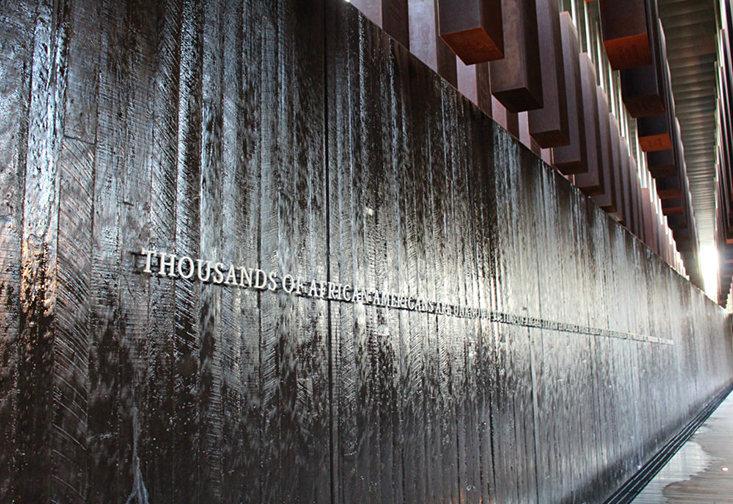In 1914, John Evans was lynched in St. Petersburg.
Evans was accused of the murder of the real estate developer Ed Sherman and attacking Sherman’s wife. Evans was a laborer who was recently fired by Sherman. Though never identified and never given a trial, Evans was arrested and thrown in jail. On the night of November 12, a mob took him from the jail, and in front of 1,500 people from the local community, hanged him from a light post.
Evans struggled for a time to hold himself up by wrapping his legs around the pole. Eventually, a woman in a car drove by and shot Evans. Soon others in the crowd began shooting at the man, killing him.
“His body was left hanging there for quite some time after as a reminder to the black community,” said Julie Armstrong, a professor of English at the USF St. Petersburg campus. “This event was the very definition of a spectacle lynching, and it sent a message about white supremacy and white hierarchy.”
Hundreds of African American residents left St. Petersburg soon afterwards. It was the first documented lynching in the city, but it wasn’t the last.
More than 10 years after the death of Evans, Parker Watson was lynched in St. Petersburg in another horrific violent crime. This time however, the local black, and certain elements of the white community, denounced the act, according to newspaper articles and other historical documents of the time.
Now a coalition of scholars, activists and civic leaders are working to research such episodes of racial violence, and installing the first lynching memorial marker in St. Petersburg, designed to document and act as a visual reminder of the city’s racial history.
This initiative is led by the Pinellas County Community Remembrance Project Coalition, whose mission is to “bear witness to the legacy of racial terror, epitomized by lynchings in America.” The coalition members include representatives from USF St. Petersburg, Foundation for a Healthy St. Petersburg, the Association for the Study of African American Life and History, St. Augustine’s Episcopal Church, the Florida State Senate, the NAACP and many others.
Their work is part of a larger, nationwide effort by the Equal Justice Initiative to increase public awareness of America’s history of racial violence and how that history impacts present-day racial issues, poverty and mass incarceration. The Initiative, founded by acclaimed lawyer and writer Bryan Stevenson, has documented more than 4,400 lynchings, primarily in southern states, from 1877-1950.
“By memorializing victims of this racial terror, hopefully you get people to pay attention to and talk about this history and perhaps it leads to reconciliation of racial tension that exists in the U.S.,” said Jacqueline Hubbard, co-chair of the coalition and a retired lawyer.

The marker, which is being funded by EJI and inspired by the National Memorial for Peace and Justice (pictured here), along with additional funding support from partners and individuals in St. Pete, is planned to be installed on Martin Luther King Jr. Street and 2nd Avenue South on November 12. Photo by EJI.
Along with installing a marker on the site of the 1914 lynching, which is being donated by the city of St. Petersburg, the coalition is researching and archiving information around other lynchings and uncovering previously unknown lynchings that occurred in the region. They also are organizing an essay contest and encouraging public conversations around these issues.
“The marker is really just a jumping off point,” said Armstrong, who is part of the coalition’s research team and drafting the text for the historical marker. “There are deep race and class divides still that we need to honestly address and the marker is one step in that process that we hope can lead to greater community conversations.”
A trove of documents – from newspaper clippings to personal diary entries and from images to correspondences – uncovered and collected throughout the research are being archived by USF St. Petersburg graduate student Maxwel Stone. A physical archive will be located at the James Weldon Johnson Community Library in St. Petersburg, while a digital version is being developed to provide a valuable resource for those wanting to dig deeper on these issues and events.
“What I have learned working on this project is that St. Pete history isn’t different from elsewhere in Florida or most other places in the South when it comes to race and injustice,” said Stone, who is earning a master’s degree in Florida Studies. “But the city has come a long way and has been really supportive in this endeavor. And personally, it has got me more involved in the community where I live.”
The marker, which is being funded by EJI, along with additional funding support from partners and individuals in St. Petersburg, is planned to be installed on Martin Luther King Jr. Street and 2nd Avenue South on November 12, the site and date of the lynching of John Evans.
“Reconciliation can only come from knowledge and acknowledgement,” said Hubbard. “That is why it is relevant to have a memorial for lynching victims, particularly in areas where they occurred.”
